By Lucy Komisar
It takes a while, through your laughter, before you realize that Branden Jacobs-Jenkins‘ comic play, “An Octoroon,” is forcing you to confront slavery. Sure, the plot is about slaves who are being sold off because their owner can‘t pay the mortgage. But the dialogue of those slaves seems like it comes from a TV sitcom, mixing current daily realities with that of the slaves. Director Sarah Benson‘s stunning light touch sneaks up on you.
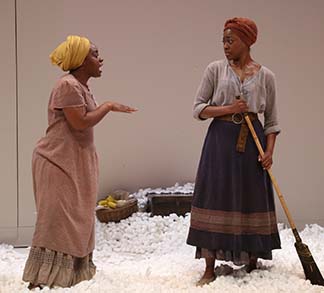
Slave Minnie (Maechi Aharanwa) says to slave Dido (Pascale Armand): “Oh, you know, Chris was messin’ with Trisha over in the sugar mill for a li’l bit an’ I met him and Darnell through her at a slave mixer over by the river before she dumped him because, you know, she couldn’t deal with the long-distance.” A slave mixer? Aharanwa and Armand are a terrific comic duo.
Minnie says, “Even all these white people are being really quiet. I wonder what’s going on today. I couldn’t read that sign out front, because I can’t read.”
Dido says: “I can’t read it, either. You know it’s illegal for us to read.”
Talking about another slave, Minnie says: “She came by the servants quarters last night for a drink and to say goodbye.”
Dido: “Say goodbye for what?”
Minnie: “I don’t know. Maybe she got sold?”
Dido: “They don‘t let you say goodbye when you get sold.”
Minnie: “Then maybe she takin‘ a trip? I don’t know.”
Dido: “A trip to where, Minnie?! Slaves don’t take trips!”
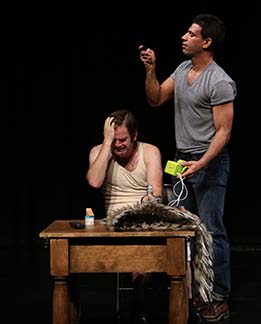
Branden Jacobs-Jenkins has very smartly and devilish cleverly taken an 1859 play by the Irish playwright Dion Boucicault, “The Octoroon,” and altered it to make a statement about slavery and also about racism.
He starts out with himself, playwright BJJ (Austin Smith), complaining that he can‘t find white actors to perform in his play. His therapist tells him to use black actors. So some black actors put on white face. And a couple of white actors put on black face. A white actor playing a drunk Boucicault (Haynes Thigpen) as an Indian puts on redface. (Minnie and Dido stay in their skins.) It says something about shifting identity – how skin color defines status and power.
I could have done without BJJ in his underwear – in fact that whole first part was too long — but when the “story” begins, with a startling scene change that opens to Minnie and Dido sweeping cotton (balls), the play gets giddily started. (The sets are by Mimi Lien.)
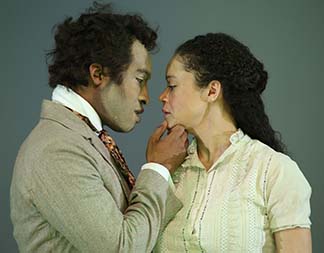
Since there aren‘t enough white actors, Austin plays both George, a sophisticated gentleman who has returned from Paris and is the good-guy nephew of the late plantation owner and his widow, and M‘Closky, the evil financial operator, with moustache and black hat, who wants the plantation and Zoe (Amber Gray), the octoroon daughter of George‘s uncle. Austin, is making his professional New York stage debut in fine style.
George is smitten with Zoe. But Dora Sunneyside, a rich local belle, (the very talented and funny Mary Wiseman), has her sights on him. Dora, who sings deliciously off-key, is a goofy lady who chooses improbable ball gowns as her day wear.
There‘s some minstrelsy step-‘n’-fetchit by Pete (the very good Ian Lassiter), who is always ready to betray other slaves.
The mortgage is due, and Mrs. Peyton doesn‘t have the cash. If George marries Dora, he can save the property. Mortgage + damsel in distress + villain + hero. Heard that before?
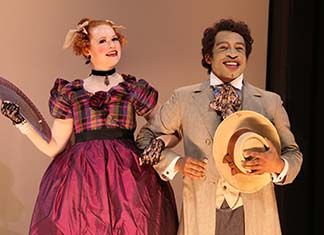
There could be a way out. A due debt from a British company is about to be paid. But George doesn‘t know that.
The plot thickens with the arrival of a huge rabbit clad in suit, vest and white gloves. He twists his outsized quizzical head around, seeming to peer at the audience, and sets up a tripod camera, which will be the deus ex machina of the plot. (The rabbit is playwright Jacobs-Jenkins, though that is not indicated in the program. It‘s part of the fantasy.)
M‘Closky, doing a dastardly murder, intercepts the London letter. An auction of the property and the slaves, including Zoe, will be held.
If you think all this requires a piano for the silent-screen villainy story, you don‘t get that. But you do get the excellent, vibrant sounds of cellist Lester St. Louis, who sits off to the side.
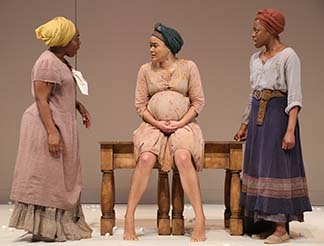
Meanwhile, we learn that most of the slaves have escaped. The report comes from Grace (Danielle Davenport), who was head of the Runaway Planning Committee, but was left behind when she overslept.
Minnie is annoyed she hadn‘t been invited to join the group: “Yeah, I didn’t wake up thinkin’ this was where my day was gonna go. I can’t believe nobody told us they was running away.”
At the slave auction, Minnie and Dido do a sexy dance movement as if this were an audition.
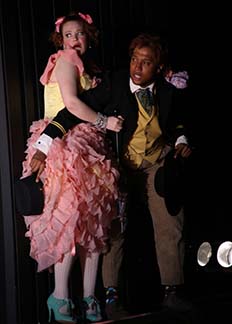
The plantation is called Terrebonne, French for good land. But half-way through the play, a slide that covers the backdrop reminds us what this is all about. No spoiler here. But then you begin to think about what the hokey plot conceals.
Getting ready to leave the plantation when they‘ve been sold to a riverboat captain, Dido says, “And how are you just now starting to pack when we leaving in like an hour?”
Minnie: “I ain’t know it took this long. I ain’t neva had to move before, girl.”
Dido: “It’s wrapping up all yo’ damn voodoo dolls that’s taking so damn long.”
Minnie: (hurt) “Those are my collectibles…”
Later, Minnie tells Dido, “I know we slaves and evurthang, but you are not your job. You gotta take time out of your day to live life for you.”
Got it? It‘s surreal when you imagine slaves having lives that can be described in today‘s normal conversation. A slave mixer? Collectibles? You are not your job? That‘s all they were. Comic, right?
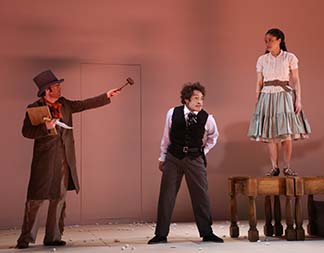
The prize of the auction will be Zoe. Some of the buyers sit in the audience shouting their bids. (The auctioneer actor who has played the Indian explains that his face is red from sunburn.) The Indian is accused of the murder of a slave boy. The whites want to lynch him. Suddenly, the jokes are not so funny.
But lighten up. There‘s a great scene (designed by fight director J. David Drimmer) where George (charming Smith) fights M‘Closky (Smith with scowl and black hat).
Is this a comedy or tragedy? A little of both. And a sharp political comment.
Soho Rep‘s “An Octoroon.” Written by Branden Jacobs-Jenkins; directed by Sarah Benson. Theatre for a New Audience, Polonsky Shakespeare Center, 262 Ashland Place, Brooklyn, NY. (catty-corner from BAM Opera House; Atlantic Ave or Nevins St subways). 866-811-4111. Opened Feb 26, 2015; closes March 29, 2015. Tickets for under 30s or full-time students $20. 2/27/15.

